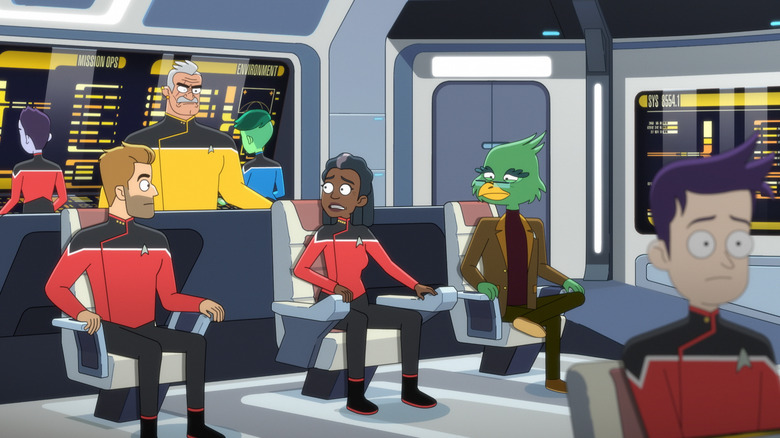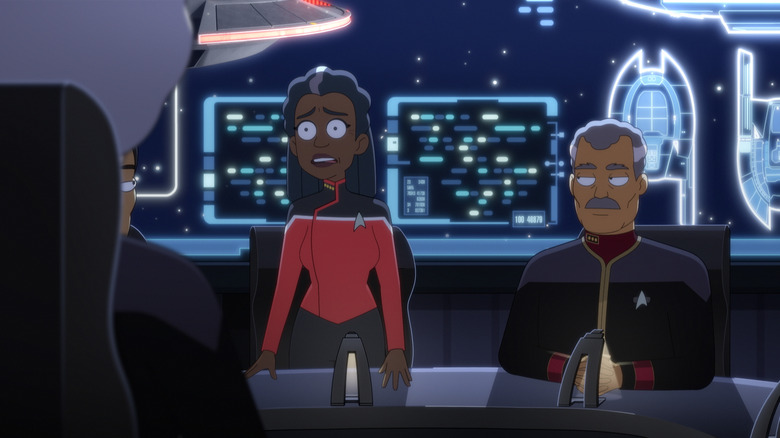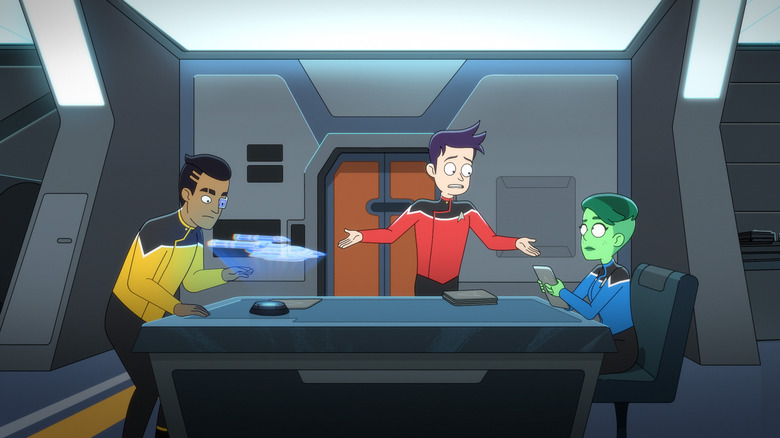Star Trek: Lower Decks Just Loves Being Star Trek, And That's Why It Works
This post contains spoilers for the season 3 finale of "Star Trek: Lower Decks."
One of the reasons "Star Trek: Lower Decks" is so funny is that is focuses on a smaller, more pathetic corner of the "Star Trek" universe. In following a quartet of lower-ranking officers on an under-equipped, inauspicious ship, audiences can see for the first time how difficult and frustrating being a Starfleet officer can really be. It's incredibly illuminating — and depressing — that ensigns don't even have quarters on a California-class vessel, having to sleep on open bunks in a hallway. All of one's worldly belongings have to fit in a single drawer and there is one shower for dozens of officers. Starfleet, "Lower Decks" points out, isn't always glamorous and adventurous. Often, it's just menial tasks and the distant sense of feeling a little pathetic. This serves as a juxtaposition of classic 1990s "Star Trek: The Next Generation" episodes, which make every week seem like a meeting of the greatest, most important minds operating in the galaxy.
But this isn't to say that "Lower Decks" is thumbing its nose at '90s-era Trek. Indeed, with its latest episode "The Stars at Night," "Lower Decks" shows that even a California class vessel retains a level of professionalism and resourcefulness that puts it on par with any other Starfleet ship. Officers gather in their respective departments (command, security, engineering, medical) to receive sage advice from their respective department heads. Everyone is operating at peak efficiency to take on a trio of artificially intelligent starships that have gone rogue. In telling a more straightforward adventure story, "Lower Decks" proves that — pathos aside — it can function perfectly well as "Star Trek."
Real Star Trek
One of the reasons "Star Trek" remains so appealing to so many is its bloody-minded adherence to formality and structure. The bulk of Trek shows take place on well-maintained exploration ships that abide by a rigid, military command. There are ranks, departments, and bosses above bosses. There is a bureaucracy in place. And because the ethos of Starfleet is to remain open-minded and helpful, any officer has the chance of being listened to. Ideas are always heard and respected, even if they're not implemented; both Worf (Michael Dorn) from "Next Generation" and Shaxs (Fred Tatasciore) from "Lower Decks" are routinely rejected, but that doesn't stop them from suggesting things.
The precisely governed world of "Star Trek" is a big part of Gene Roddenberry's utopian promise. Everyone is working to better themselves and the galaxy around them, and there's a system in place to support it. We are still given to petty impulses and dark drives occasionally, but the characters on "Star Trek" tend to acknowledge when they've failed. The optimism remains.
Ensigns Mariner (Tawney Newsome), Boimler (Jack Quaid), Tendi (Noël Wells), and Rutherford (Eugene Cordero) are often frustrated or overwhelmed or intimidated by their jobs or their superiors, but they always come back to the notion — always earnestly presented — that Starfleet is a good idea. In "The Stars at Night," Mariner argues that Starfleet is an idea, not just a bureaucracy, and it's going to be worth risking one's life for. In an earlier episode, "Reflections," Boimler has something of a breakdown when others dare attack Starfleet as outmoded, stodgy, dangerous, and even colonialist. These people may lose their cool, but they retain their principles.
Starfleet life sucks, but it's great
So when the time came to look past the pettiness and the loss of one's cool, there was "Star Trek" waiting in the back. However strange and funny and crass "Lower Decks" can become — this is a show that featured masturbating mugatos — it has idealism at its heart. While it may not look like the galaxy is bright and full of hope while sleeping on a dorm-like bunk with towel-clad co-workers constantly interrupting your studies, it will be once the frustrations pass. Starting on the bottom is, as the quartet of ensigns is constantly learning, the finest catalyst for growth. In the show's three seasons, the main characters have come to understand themselves a lot better, realized why Starfleet is important to them, and how they are indeed quite passionate about their jobs. Mariner has learned to be a little less caustic, Boimler a little less afraid, Tendi a little less timid, and Rutherford ... well, Rutherford loves being an engineer regardless.
So while "Lower Decks" may be a crass comedy show first, and a winking deconstruction of Trek's propensity of formalism second, on a tertiary level, it's a traditional — and upbeat — "Star Trek" show. Not every Starfleet crew is lucky enough to deal with complex ethical conundrums, diplomatic disasters, and colossal negative space wedgies on a regular basis. Sometimes a crew will have to worry about their careers or their status, fight others for dorm space, and occasionally be lazy. But so long as they believe in exploration, peace, and benevolently helping others as a matter of course, then the show will remain a loving addition to the "Star Trek" canon.
"Lower Decks" is certainly that.


